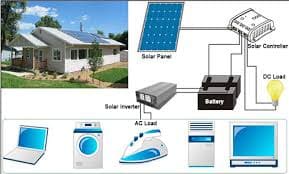How long do solar panel last?
Solar energy is the biggest renewable energy source. Solar energy is used to generate electricity by using solar panels. But the question is how long do solar panel last on a house? Let’s try to figure out the appropriate answer. If you are asking about the lifespan of solar panels, they can last for 25-30 years or more, with many manufacturers providing warranties for that length of time. Factors like shading and orientation can affect the lifespan of solar panels in several ways. Shading can significantly reduce the performance of solar panels and also impact their lifespan. When a solar panel is shaded, it can no longer convert sunlight into electricity effectively.
How do factors like shading and orientation affect the lifespan of solar panels?
It may result in a reduction in energy output. If a panel is partially shaded for an extended period, it can cause hot spots on the panel's surface that can damage the panel and decrease its lifespan.
The direction that a solar panel faces can also impact its lifespan. The optimal orientation for solar panels depends on the latitude and climate of the location where they are installed. Solar panels should be oriented to face south in the Northern Hemisphere and north in the Southern Hemisphere, as this allows them to capture the most sunlight over the day. Panels that are not oriented optimally may not produce as much energy as they could and may have a shorter lifespan as a result.

Another factor that can impact the lifespan of solar panels is the angle at which they are installed. The ideal angle for solar panels depends on the latitude of the location and the time of year. Panels that are installed at the wrong angle may not be able to capture as much sunlight as they could, which can reduce their energy output and lifespan.
It is important to ensure that solar panels are installed in a location that receives as much sunlight as possible and is free from shading. Proper orientation and installation angle are also important considerations that can impact the lifespan of solar panels. By taking these factors into account, solar panel owners can help ensure that their panels perform optimally and last for their intended lifespan.
Can the lifespan of solar panels be affected by the quality of installation or the brand of the panels?
Yes, the lifespan of solar panels can be affected by the quality of installation and the brand of the panels. The quality of installation can have a significant impact on the performance and lifespan of solar panels. Poor installation, such as incorrect placement or inadequate fastening, can cause the panels to be exposed to more wear and tear and can also result in reduced energy output. On the other hand, a high-quality installation that takes into account factors such as the angle and direction of the panels, proper wiring, and secure mounting can help ensure that the panels function optimally and last for their intended lifespan. It is noted that if a solar panel goes out or life is over then it may recycle by a special process. So, how to recycle solar panels?
The brand of the panels can also play a role in their lifespan. Higher-quality brands typically use better materials and manufacturing processes, which can result in panels that are more durable and long-lasting. Cheaper panels from less reputable brands may not be built to the same standards and could be more prone to issues such as defects or premature wear and tear.
The lifespan of solar panels is also affected by other factors such as weather conditions, regular maintenance, and overall usage. However, installation quality and brand are two important considerations that can impact the longevity of solar panels. When choosing solar panels, it's important to do your research and choose a reputable brand and a qualified installer to ensure that your panels last as long as possible.
What happens to solar panels at the end of their lifespan, and how are they disposed of?
At the end of their lifespan, solar panels are typically taken down and recycled or disposed of. The lifespan of a solar panel can vary depending on the quality of the panel and the conditions in which it is used, but most panels will last between 25 and 30 years.
When it comes to disposing of solar panels, there are a few different options. One option is to recycle the panels. This involves breaking the panel down into its parts, such as glass, aluminum, and silicon, and then reusing those materials to make new panels or other products. Recycling is becoming more and more common as the demand for solar panels increases and the need to dispose of old panels grows.
Another option for disposing of solar panels is to send them to a landfill. However, it is not the most environmentally friendly option, as the panels can take hundreds of years to decompose and may release toxic materials into the environment as they break down.

Some companies are getting creative with how they dispose of solar panels. For example, a company in the Netherlands called Super use Studios is using old solar panels to make stylish and functional furniture, such as tables and benches. This approach not only reduces waste but also gives new life to old panels.
To recycle and repurpose, there are also efforts underway to develop new technologies that can make it easier to recycle solar panels. For example, researchers at the University of New South Wales in Australia are developing a way to recycle silicon in solar panels by turning it into nano-silicon powder that can be used in a variety of applications.
As the use of solar panels continues to grow, it will become increasingly important to find sustainable and responsible ways to dispose of them at the end of their lifespan. There are many creative and innovative solutions being developed to address this challenge.
Final thought
The actual lifespan of a solar panel can be influenced by various factors such as the quality of the materials used, the installation process, the weather conditions, and the level of maintenance. It's also worth noting that solar panels don't just stop working after 30 years, but their efficiency will gradually decrease over time. After 25-30 years, they may still be functioning, but their output may be significantly lower than when they were first installed. With proper maintenance and care, solar panels can continue to produce energy for many years beyond their expected lifespan.


No comments yet